Culture Day

Culture Day (文化の日, Bunka no Hi) is a national holiday in Japan, celebrated on November 3, to honor culture, the arts, and academic achievements. It has been held annually since 1948.
The holiday was first established to commemorate the adoption of Japan’s post-war Constitution, which was announced on November 3, 1946. However, before this, the date was significant for another reason—it was the birthday of Emperor Mutsuhito (1868–1912), the 122nd Emperor of Japan. His reign, known as the Meiji era, marked a period of great transformation, during which Japan emerged as a modernized nation with a thriving cultural identity.
After Emperor Mutsuhito’s death in 1912, his contributions began to fade from public memory. To recognize his role in Japan’s progress, his birthday was officially designated as Meiji-setsu (Meiji Celebration) in 1927. This continued until 1948, when the new government passed the Holiday Law, renaming the occasion Culture Day and shifting its focus to the celebration of arts and intellectual achievements.
Although the modern holiday officially distances itself from Emperor Mutsuhito, many acknowledge the historical connections between the two occasions. Today, Culture Day is celebrated with exhibitions, cultural festivals, and award ceremonies across Japan, highlighting the country’s artistic and academic contributions.
Culture Day is dedicated to cultural education and the appreciation of beauty, making November 3 a day filled with events that showcase Japan’s rich traditions. People can experience festivals, martial arts demonstrations, tea ceremonies, traditional music, archery, and more. Museums across the country offer free admission, allowing visitors to immerse themselves in Japan’s history, while exhibition halls organize special cultural displays.
One of the key events on Culture Day is the All Japan Kendo Championships (全日本剣道選手権大会, Zennihon kendō senshuken taikai), held annually at Nippon Budokan Arena. Kendo, a traditional Japanese martial art, evolved from the fencing techniques of the samurai and is now a competitive sport using bamboo swords (shinai). The championship features 64 competitors, and earning a place in the tournament is considered even more prestigious than competing in the World Championships.
Another significant tradition on Culture Day is the awarding of the Order of Culture (文化勲章, Bunka-kunshō) at the Imperial Palace in Tokyo. This prestigious honor is presented by the Emperor of Japan to individuals who have made outstanding contributions to culture, including achievements in art, literature, science, music, cinema, and theater. The award highlights the importance of cultural development and recognizes those who have enriched Japan’s artistic and intellectual legacy.

